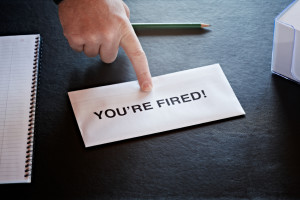#BestofFSCBlog : 14 Things to Do After you Get Fired. Rule #3- Important: Don’t Sign any Severance Documents. MUst REad for All!
The words “you’re fired” are terrifying to hear, both for contestants on “The Apprentice” and for everyday, hard-working Americans. If you’ve just been fired from your job, your instinct might be to cry, to shout and to spend a much-deserved vacation on your couch sulking in sadness. But you shouldn’t.
Being fired does not mean the end of the road for your career. It just means you have a new full-time job: managing your finances carefully while earning new employment.
How? By remaining level-headed, persistent and proactive. Here’s what to do if you have just been fired.
1. In the room when it happens, there are certain things to avoid.
Realizing that you no longer have a dependable paycheck can be frightening, especially when you don’t know how long you’ll go without pay. Spend time with your budget, cutting expenses where possible – entertainment and travel, for instance – and dip into your emergency fund if you have one.
If things are going to be rough almost immediately (i.e., you live paycheck to paycheck), you’ll need to consider housing with lower costs, downgrading to a car with lower, or no, monthly payments or even getting a roommate.
10. Get a temporary job or side gig.
If finances are challenging during your unemployment, find a temporary job, like retail or food service.
This will also prevent a gap in your employment. In today’s gig economy, you can consider self-employment options like freelance writing or driving for Uber. Remember, though, that some gigs may require an upfront investment or may not pay out immediately.
11. Take care of yourself.
In an interview with Monster.com, Dr. Melodie Schaefer, from The Chicago School of Professional Psychology, identified self-care as a crucial practice during unemployment.
This means staying fit, whether it’s working out or taking a walk in the park, and engaged, like a game night with friends and family. Keep mentally fit by doing crossword puzzles or free brain training apps.
12. File for unemployment.
If you were not terminated because of clear misconduct, then it’s likely that you qualify for unemployment. The Balance recommends checking with your state’s unemployment office to see if you’re eligible.
In general, the unemployment office will side with you over your employer unless there is a clear, demonstrable offense for which you were let go. If you’re not sure, just go for it.
That was the biggest regret for Nichole B. of Dayton, Ohio, when she was terminated last spring for metrics that were beyond her control. Because there were some discrepancies about her performance, she wasn’t confident in applying.
“I didn’t apply for unemployment and I wish I would have. I wouldn’t have gone through nearly as much of my emergency savings as I did,” Nichole said.
Nichole’s story, fortunately, had a happy ending. Shortly after beginning her job search, her previous company unofficially admitted it was wrong for firing her and did the unthinkable. “I was approached by my former company and asked to come back,” Nichole explained. “I ended up returning because they offered me incredible pay, a better schedule and a manager title.”
13. Update your resume and start applying for jobs.
The most important thing you can do when fired is to begin looking for work again. The shorter your gap in employment, the stronger your resume — and finances — will be. The Balance explains that resumes and cover letters need not address your termination; just stay positive: “There is no point in bringing up the circumstances of your leaving until you have to.”
14. In applications and interviews, be honest.
While you can typically avoid mention of your termination in your resume and cover letter, honesty is key in your applications and interviews.
In fact, lying on an application can disqualify you from unemployment benefits and could be grounds for termination at any point, should that company hire you.
Senior talent acquisition specialist at Forrester Research, Abigail Smith, gave some solid advice for anyone who has been fired and is prepping for their first application or interview. “Do your homework on the company. See if you know anyone who works there or a second connection who could maybe introduce you to be referred in,” Smith said.
She added, though, that “honesty is the best policy when it comes to why you were fired.”
Smith and any other skilled recruiters or hiring managers will be sure to get to the bottom of your employment history in an interview. “I will typically ask what made them change companies,” Smith said. “Really what I want to know is if they left on good terms. If performance was the reason they left, how were they measured for success in that role? What limited them from performing well?
“If there is a gap in employment,” she continued, “what were they doing during that time? It could be anything from small side projects to helping a family member. We are all human. Just have a good explanation for the gap!”
In short, be transparent about your termination when asked or, if possible, find a way to bring it up before they ask and pivot with what you have done since. If it was downsizing, say so and move on. If it was performance related, explain what personal and professional steps you have taken since to improve yourself and ensure it won’t happen again.
Getting fired can be emotionally, mentally and physically draining, and, if mismanaged, the termination can wreak havoc on your finances. Be proactive in the face of termination, stay positive and don’t give up. Your next big career move is waiting for you
Businessinder.com | August 6, 2018 | Timothy Moore, The Penny Hoarder



